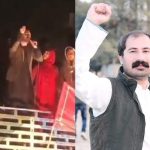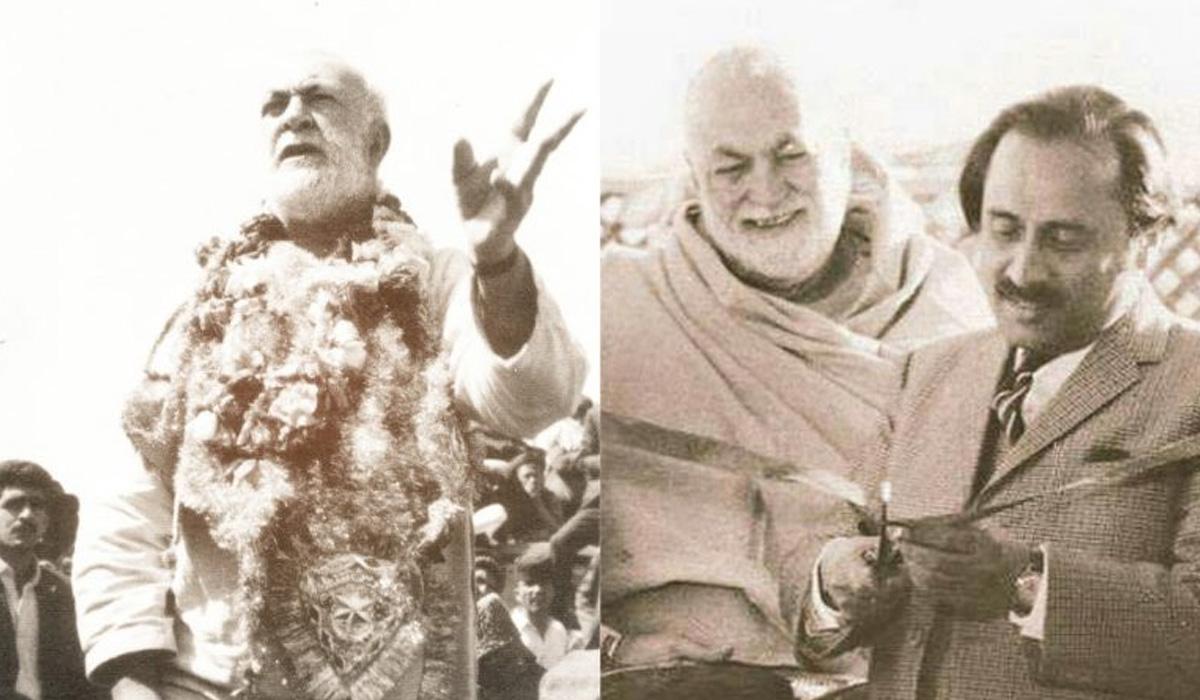The Pashtuns are a people apart; proud, loyal and fiercely independent, living by their strict moral code, Pashtunwali which is a mixture of a tribal code of honour and local interpretations of Shari’a. The Pashtun history is full of many great leaders and changemakers who have fought for the rights and political development of Pashtuns.
Today marks the 46th death anniversary of one such leader, Abdul Samad Khan Achakzai (Khan Shaheed), a Pashtun nationalist who devoted his life for his nation.
#KhanShaheed, Pashtun nationalist leader who struggled 4 freedom, education & HR. He spent more than 30 yrs in Jail for the sake of Pashtuns. He never bowed & ultimately he was killed to silent his voice.
We pay tribute to him on his 46 death anniversary.#RememberingKhanShaheed— Manzoor Pashteen (@manzoorpashteen) December 1, 2019
Remembering the pioneer of Pashtun nationalism and politics
Pashtun ideologue, writer, journalist and nationalist leader Khan Abdul Samad Khan Achakzai was remembered during a grand jalsa in Quetta today joined Mehmood Khan Achakzai, Maulana Fazlur Rahman and other renowned Pashtun political leaders.
Ground is already jam packed and thousands of people from different are yet not arrived.#RememberingKhanShaheed pic.twitter.com/UbKh3C5Kxz
— #RememberingKhanShaheed (@pashtunzoy) December 2, 2019
The meeting was organized by the Pakhtunkhwa Milli Awami Party, whose leaders vowed to follow the political principles of their founder and to defend democratic institutions of the country.
Family background
Khan Shaheed Abdul Samad Khan was born on July 7, 1907, in Innayatullah Karez, a village in Quetta. His father Noor Muhammad Khan and many other members of his family fought against the British Raj during the second Anglo-Afghan War. They defeated the British army in the field of Maiwand. His great grandfather, Barkhurdar Khan accompanied Ahmed Shah Baba as a general famous historical battle of Panipat.
His son Mahmood Khan Achakzai is currently the chairman of the Pakhtunkhwa Milli Awami Party.
Early life and education
At the age of five, Achakzai received his early education at home and was well versed in the classical Pashto, Arabic and Persian texts. After he lost his father at the age of 11, his uncle Muhammad Ali Khan patronized him.
In 1919, Khan started his formal schooling at the age of 13. He joined the local middle school and proved himself as an outstanding student, earning a scholarship during grade after he stood 1st in the entire province. Khan Shaheed earned his livelihood by selling dry fruits.
Khan showed his leadership qualities at an early age. When he was just 11-year-old teenager, he led the group of the students at Gulistan in confirmation with Khilafat Movement demonstrating against the British.
He received his primary education in his village madrassa. As a student of class eight, Khan led a procession of school boys in support of the Khilafat Movement. He was expelled from school for such a daring act against the British empire. #RememberingKhanShaheed
— Muzamil Shah (@watanyar07) December 1, 2019
He founded the first organized scientific nationalist political party for Pashtuns
In the second quarter of the 20th century, Khan Abdul Samad Khan emerged as an iconic figure in the struggle against British forces. His political acumen and continuing effort marked an end to British tyrannical rule liberating Pashtuns.
Khan’s political career rooted from a local mosque in his village where he preached the locals about the importance of politics and nationalism. He was arrested for the first time in May 1930 for his political struggle against the British colonial rule. Before the arrest, he had been served two warnings by the colonial authorities for his involvement in political activities and his lectures at the mosque.
In 1938, Khan Shaheed established a youth political organization called “Anjuman e Watan” and connected with other freedom fighters in the subcontinent and India for the liberation of the country and participated in all movements aimed at the British.#RememberingKhanShaheed pic.twitter.com/AB2Z12JJmO
— Gul bashraa (@Gulbashraa) December 2, 2019
Khan was the first one to translate the Holy Quran in the Pashto language
Khan Shaheed Baba Abul Samad Khan translted the Holy Quran into Pashto for his villagers so that they can better understand it’s true meaning. His translation of the Quran later became one of the reasons the local colonial authorities were against him.
The first interrogation from khan shaheed by the colonial authorities was against his initiative of translating the Holy Quran into Pakhtu for villagers who came to the local mosque attended by Samad Khan as a young man.#RememberingKhanShaheed
— Muzamil Shah (@watanyar07) December 1, 2019
Besides the Holy Quran, he also translated many other books to Pashto such as Tarjam-i-Quran by Maulana Abdul Kalam Azad, Gulistan-e-Saadi by Sheikh Saadi, Seerat-ul-Nabi by Shibli Numani and the Future of Freedom by Dotson Carto. He authored an autobiography named “Zama Jowand Aw Jowandun’ (he way of my life) in three volumes.
He started the first-ever newspaper in his province
Khan Shaheed was not only a politician but also a renowned journalist, poet and a writer who channelled his voice for the rights of Pashtuns through newspaper and literature.
After his seven tiring years of struggle to get the Indian Press Act extended to the region, Khan succeeded to issue the first-ever newspaper in the province’s history named “Istiqlal.”
After his release from prison in 1936, Khan Shaheed issued the “Istiqlal” newspaper and became its editor and established the Aziz Press in the name of Yusuf Ali Khan Magsi. Most of the newspaper work was voluntary, from printing to distribution.#RememberingKhanShaheed pic.twitter.com/0lFMwYhA9o
— Muhabat Khan Tareen (@MuhabatKhan) December 1, 2019
Khan believed in Feminism and women empowerment
Despite living in a profoundly patriarchal society of Pashtunkhwa– a product of the colonial, capitalist, conservative and extremist forces, Khan Shaheed believed in treating men and women equally.
Khan Shaheed enrolled his daughter named Khor Bibi at a young age in boys school of Gulistan. The conservative Pashtuns who were invaded and separated from Afghanistan under Gandamak and Durand treaties imposed by the colonial regime could not accept Khan Shaheed’s decision to send her daughter to school. As the school was a bit away from their house, Inayatullah Karez, Khan Shaheed arranged a bicycle for his daughter to travel through villages and reach the school comfortably.
He would take Khor Bibi with him to the official meetings in Afghanistan to show his countrymen and women how important it is to include women in consultations. He wanted to ensure that women are given due space and role in political activism and nationalist progressive, anti-colonialist and anti-capitalist struggle.
. Abdul Samad Khan Achakzai believed in equity, was staunch advocate of women rights, and challenged taboos for women voter registration for the general election in 1970.#RememberingKhanShaheed#PTMMiranShahSitIn#ReleaseAlamgirWazir pic.twitter.com/hRneisyZJX
— Aimal Tareen (@AimalTareen5) December 1, 2019
He was also the first Pashtun leader who brought her daughter in politics and showed to the nation that the participation of women was pivotal in the national struggle.
He was labelled as a traitor by the Pakistani government
Khan Shaheed spent more than thirty years in prison for his nation. Still, despite all the struggles for the bright future of his people, he was betrayed and labelled as a traitor several times. He was the first target of General Ayub Khan’s Martial law. He was arrested on the second day of the martial law and brought to a special military court in the Quetta Municipal Corporation Hall which sentenced him for 14 years on totally false allegations.
In 1969, Ayub Khan called a round table conference & released all the political prisoners including Khan Abdul Samad Khan. He then spent the last four years of his life (1969-1973) struggling for universal franchise, one-person-one-vote in Balochistan and the tribal areas where only members of official Jirga were entitled to vote.
On the midnight of December 2 1973, two grenades were thrown into his house located on Jamal Din Afghani Road Quetta, which resulted in his martyrdom.
Khan Shaheed Baba was a true son of this soil who enlightened us and his life full of struggles, placed such standards and pathways which will always be sunlight for us to follow.


